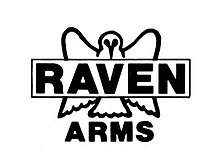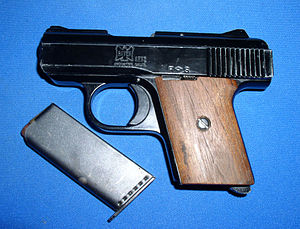Raven Arms
 |
|
| Private | |
| Industry | firearms |
| Founded | 1970 |
| Founder | George Jennings |
| Defunct | 1991 |
| Headquarters | Carson City, Nevada, Irvine, California and Costa Mesa, California, U.S. |
|
Area served
|
U.S. |
|
Key people
|
Paul Jimenez |
| Products | weapons, Semi-automatic pistols |
| MP-25 | |
|---|---|

MP-25 with blued finish
|
|
| Type | Semi-automatic pistol |
| Place of origin |
|
| Production history | |
| Designer | George Jennings |
| Designed | 1960s |
| Manufacturer | Raven Arms |
| Produced | 1970-1991 |
| No. built | 3 million |
| Variants | P-25 |
| Specifications | |
| Cartridge | .25 ACP |
| Action | Blowback |
| Feed system | 6-round detachable box magazine |
| Sights | Post and rear notch |
Raven Arms was a firearms manufacturer established in 1970 by firearms designer George Jennings. The Gun Control Act of 1968 prohibiting the importation of inexpensive handguns prompted Jennings to design the MP-25, a .25-caliber semi-automatic pistol, and enter the firearms business. Raven has been referred to as the original "Ring of Fire" company; the Ring of Fire companies were those known for producing inexpensive Saturday night special handguns.
Raven kept manufacturing costs to a minimum by building their guns from injection-molded Zamak, a zinc alloy.
Before Jennings developed the MP-25, a friend who owned a pawn shop that sold firearms complained to Jennings that his supply of inexpensive imported handguns (typically made by Röhm Gesellschaft) had been cut off due to the Gun Control Act of 1968, resulting in a significant loss of sales. At the time, Jennings operated a machine shop that made parts for Southern California aerospace companies. Jennings established Raven Arms to produce the MP-25 for his friend, and over the next 20 years, the company sold approximately 2 million pistols. In parallel with this growth, gun-control advocates started pushing legislation in Washington, in state capitals, and in city councils to ban inexpensive weapons.
In November 1991, a fire destroyed the Raven Arms factory. Jennings retired and sold his designs to Phoenix Arms. Phoenix was owned in equal shares by George's ex wife, his children, four of his grandchildren, and by Raven's former general manager. Phoenix continued to produce the MP-25, and under the management of George's son Bruce, developed additional .22 and .25-caliber pistols, called the HP22 or HP25.
There are conflicting views on the MP-25. Critics refer to it by the pejorative term "Saturday night special", as it is both easily concealed and affordable enough that the poor can afford to purchase it. However, according to Roy Innis, president of the activist group Congress of Racial Equality (CORE), "To make inexpensive guns impossible to get is to say that you're putting a money test on getting a gun. It's racism in its worst form." Some advocates of the pistol say that it is reliable, despite its low cost. A 1998 Bureau of Alcohol, Tobacco, Firearms and Explosives publication warned that the pistol may discharge unintentionally when the safety is released.
...
Wikipedia
